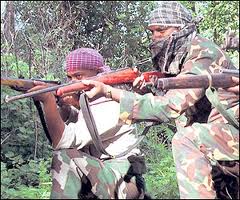Patna, Jun 13: A group of around 200 Naxals attacked the Dhanbad-Patna intercity express near Jamui district in Bihar, killing one Reserved Special Force (RPF) jawan, a police personnel and another passenger apart from injuring six passengers, including the train guard. At least 500 passengers are believed to be on board.
The deceased have been identified as constable Sukhnath Deonath of the fifth RSPF battalion; Kumar Amit, a Bihar police personnel who was among the passengers on the train and another passenger Sharwar Alam.
The identities of the injured is yet to be ascertained.
“The train was escorted by RPF personnel, two in the front and three at the rear end. At least 150 to 200 Naxals intercepted the train at the Bhalui halt near Jamui and began firing. The RFP retaliated. The Naxals snatched two of their rifles. The trains was moved from to the Kiul junction where forces from Jamalpur and Patna were rushed,” KS Anupam, deputy inspector general (DIG), Railways said.
The Bhalui halt falls in an area the Naxal-dominated Jamui and Lakhisarai districts. “It is a no-man’s land marked by jungle and hills,” Deepak Barnwal, superintendent of police, Jamui said.
The firing started around 1.30 p.m. and lasted for nearly 40 minutes. Three jawans from the Reserve Protection Police Force (RPSF) had rifles made the passengers lie down to escape the firing, Sanjay Singh, chief security officer of the East Central Railway said.
The Railway escort party lost three rifles, including one AK 47 and two INSAS (Indian Small Arms System) rifles, Mr. Singh said.
“The jawans were firing in retaliation,” SK Bhardwaj, Additional Director General of Police, Law and Order said. It seems their motives is to spread terror and snatch the arms from the jawans.
The relief operations started immediately as the trains reached Kiul. Medical vans were rushed to Kiul to provide aid to injured passengers. The Central Reserve Police Force was also rushed for rescue.
The train will be leaving from Kiul for Patna.





Comments
Add new comment